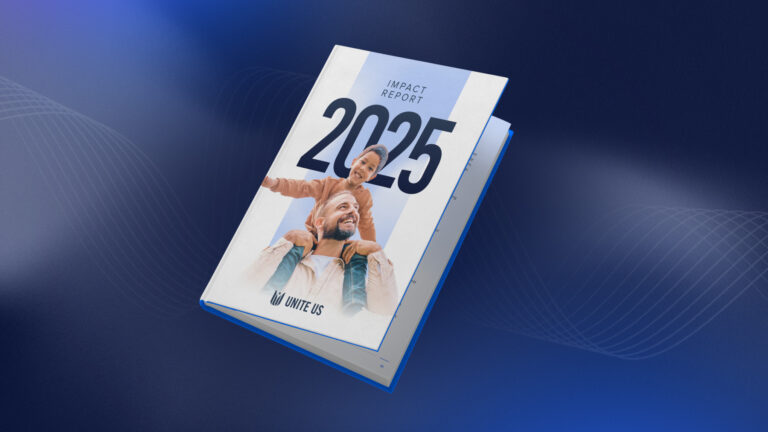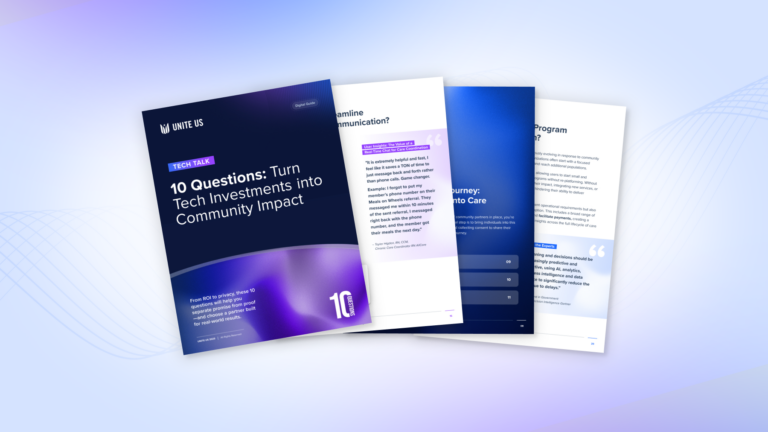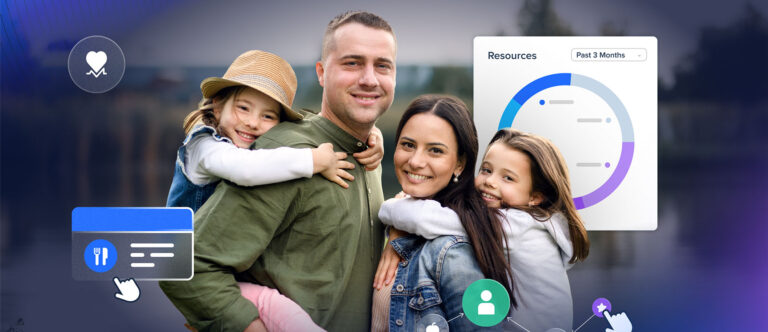
Community Health Workers: The Cornerstone of Scalable Social Care Transformation
By Dr. Monica Lallo, Senior Vice President, Acenda Integrated Health
How New Jersey’s Community Health Worker (CHW) Hub underscores the need to address health and social needs, collect and analyze social drivers of health (SDoH) data, and scale social care models nationwide.
Earlier this year, we sat down with the team at Acenda Integrated Health to celebrate Community Health Workers Week; a time to celebrate, commemorate, and collaborate with each other and to raise awareness of the diversity of the CHW profession, workforce, and movement.
To further explore the integral role CHWs play in driving social care transformation, we invited Dr. Monica Lallo, Senior Vice President of Acenda and head of New Jersey’s CHW Hub, to reflect on the importance of empowering CHWs with the tools they need to implement best-fit interventions and improve whole-person health at scale. Let’s learn from her experience and valuable insights!
Healthcare disparities are a constant challenge, but I’m inspired daily by the profound impact Community Health Workers (CHWs) have on our communities here in New Jersey.
After over a decade working across different levels of systems, I’ve seen how CHWs can bridge gaps in New Jersey’s healthcare, and I’m proud to contribute to Acenda Integrated Health’s dedication to prevention, treatment, and wellness services that empower individuals and communities.
Acenda Integrated Health operates in 12 counties in New Jersey with over 30 distinct locations offering various types of services, including family success centers, counseling, residential, and specialized support offices.
At the heart of our mission is New Jersey’s CHW Hub. Funded by the New Jersey Department of Health and launched in 2024, the Hub integrates CHWs into healthcare systems, local health departments, and community-based organizations to address health and social needs and use data-driven insights to inform broader social care strategies.
The success of the CHW Hub demonstrates how empowering CHWs improves healthcare, well-being, and social care data visibility across communities, with an emphasis on the most vulnerable and marginalized.
What is a Community Health Worker?
The heartbeat of their communities, CHWs connect their neighbors to the healthcare system, every single day. Living in the neighborhoods they serve, CHWs understand local dynamics, culture, and challenges deeply. Their core responsibilities include outreach, health education, care coordination, and navigating social services.
CHWs wear many hats: educator, navigator, advocate, and friend. They help individuals not only access healthcare but also thrive in their communities.
As Sydney Garnes, Acenda Project Manager for the Hub’s Southern Region, says, “CHWs can go by many different names, such as patient navigators or health educators, so it’s important to look at them from a broader scope.”
No matter what titles they go by or hats they wear, their mission is the same: to uplift their community and address any barriers individuals face in accessing care and resources.
What truly sets CHWs apart? It’s their deep-rooted connection to the communities they serve.
CHWs have an unmatched ability to gather nuanced data that traditional healthcare settings often overlook. By engaging with individuals in their daily lives, CHWs gather data often overlooked by healthcare institutions, offering deeper insights for effective intervention strategies.
What is New Jersey’s Community Health Worker Hub?
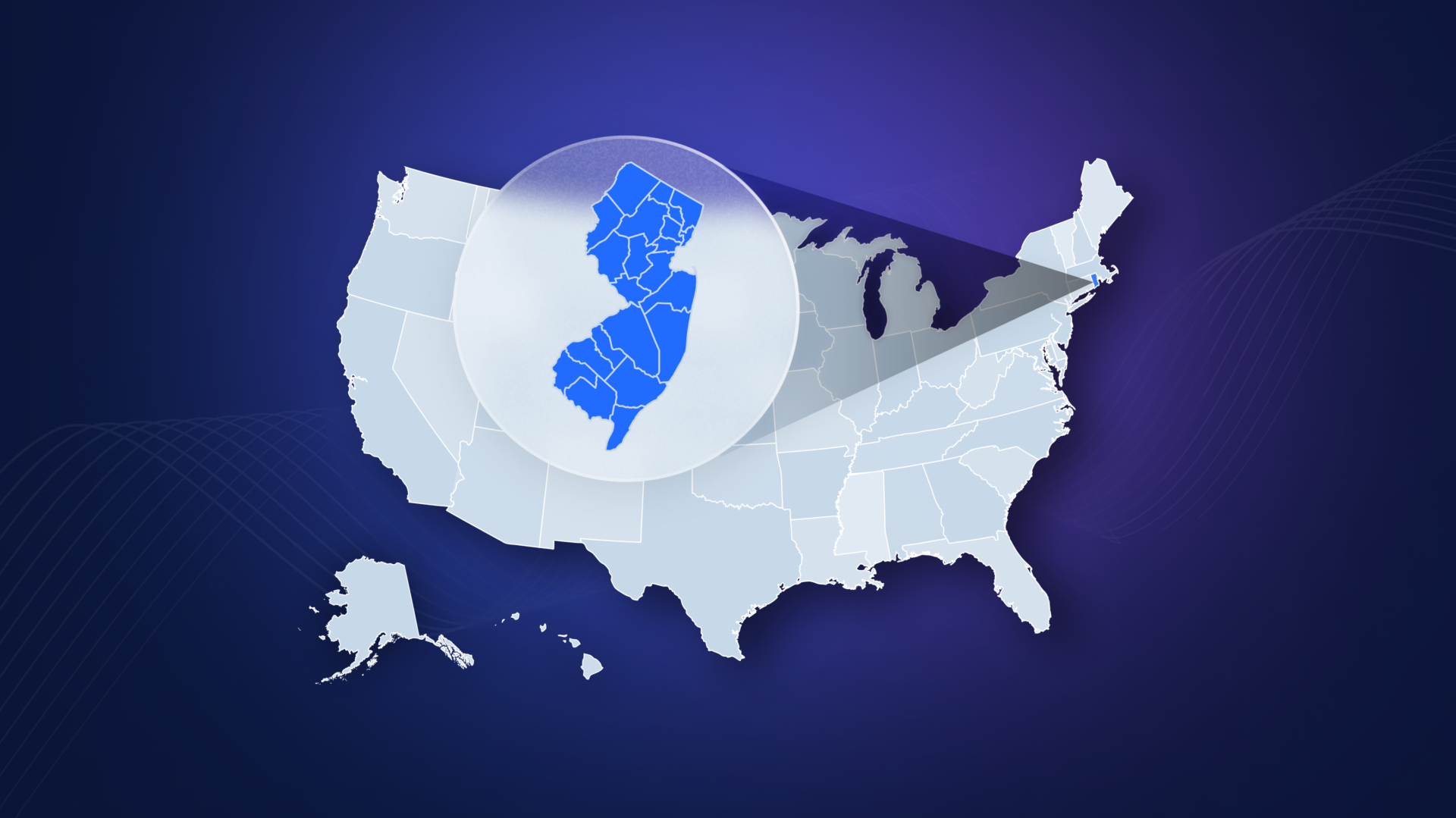
New Jersey’s CHW Hub represents an innovative collaboration between Acenda Integrated Health and a diverse network of community partners, designed to strengthen the integration of CHWs into the healthcare system.
The CHW Hub equips CHWs with the tools they need to be effective, while our partnership with Unite Us enhances coordination between healthcare and social services.
Our team has celebrated numerous successes. Trained CHWs have been deployed in underserved neighborhoods, making a significant impact. Community engagement programs have also been established. These initiatives empower individuals to take charge of their health. Not only do they enhance access to care, but they also foster a sense of community ownership in health outcomes.
The Intersection of CHWs and SDoH Data Collection
SDoH are the social and environmental factors that influence health outcomes. This data is critical for understanding health inequities; it sheds light on the root causes of disparities faced by underserved populations. From housing instability to food insecurity, SDoH data helps identify areas where interventions can make a significant impact.
Key Insights from SDoH Data
Through the diligent efforts of our CHWs, we’ve gained invaluable insights into the health needs of our communities. For instance, data-driven insights from the CHW Hub have revealed significant health disparities across different regions of New Jersey.
Here are just two findings:
- Higher incidences of chronic health conditions: Areas with high rates of unemployment consistently report higher rates of diabetes and hypertension.
- Limited access to transportation: Communities facing transportation challenges also experience increased health disparities.
The data enhances our understanding of health inequities, highlighting how social factors contribute to health issues. By revealing these critical insights, we can shape effective strategies that address and mitigate health disparities in the communities we serve.
My colleague, Dr. Oyediji, explains: “We’re able to understand how clients have been served in these communities, evaluating where we need to improve and where we need to double down on our efforts to improve the outcomes for our clients and these communities.”
Or as Josephine Awadalla, Project Manager for the Hub’s central region, states: “The data we gather tells a story. It’s a narrative of our community’s struggles, but also of their resilience. By listening to these stories, we can create equitable solutions that truly address their needs.”
CHWs as Data Collectors
CHWs are uniquely positioned to gather nuanced SDoH data through their on-the-ground interactions with community members. Their ability to engage in meaningful conversations fosters trust, encouraging individuals to share their experiences and challenges. This rich qualitative data, combined with quantitative metrics, creates a holistic view of community health.
Regional SDoH Differences Across New Jersey
In New Jersey, SDoH varies significantly by region. For example, in urban areas like Newark, while there may be more healthcare facilities nearby, residents often struggle with challenges such as overcrowding and inadequate access to mental health services.
Dr. Oyediji emphasizes the severity of these issues, stating, “Access to healthcare is a challenge in some communities, and that can lead to dire consequences for those who can’t get the care they need.”
In Central Jersey, housing instability has emerged as a particularly pressing concern. The post-COVID population surge has driven up rent prices and limited affordable housing, disproportionately impacting underrepresented and historically marginalized communities. Many are forced into unsafe or overcrowded living conditions, which detrimentally affects their well-being.
According to Josephine, “Housing instability disproportionately affects low-income families and minority communities, forcing many into evictions and unsafe or overcrowded conditions, which impacts their overall well-being and quality of life.”
Meanwhile, in South Jersey, a blend of urban and rural landscapes creates unique challenges, especially around transportation. “South Jersey has a good mixture of urban and very rural communities,” says Sydney, “so transportation has been a major issue, often hindering clients’ access to services and prolonging what could be a major health concern.”
By amplifying these voices, we can develop tailored strategies that resonate with each community’s unique context.
Challenges with SDoH Data Collection
SDoH data holds significant potential to inform effective health strategies. However, collecting and sharing this data comes with inherent challenges. For instance, standardizing data collection methods across various organizations is essential for consistency and reliability.
The lack of standardized data collection methods and formats often limits the effectiveness of collaborative efforts, hindering public health data visibility and the potential for impactful interventions.
The Role of Technology and Digital Tools
Technology plays a key role in overcoming these challenges. Digital tools can facilitate efficient data collection, enabling CHWs to access and share information seamlessly. For example, mobile applications designed for data entry streamline the process. This allows CHWs to focus on what they do best: engaging with their communities.
The Path Forward: Empowering CHWs to Drive Scalable and Systemic Change
SDoH data guides policy and healthcare decisions, helping allocate resources, design targeted interventions, and prioritize at-risk populations.
As we move forward, it’s essential to translate these insights into actionable strategies. This requires collaboration among healthcare providers, policymakers, and community organizations. Together, we can ensure that SDoH data informs decision-making at every level. This collaboration is vital for developing comprehensive training programs for CHWs, as well as advocating for their integration into healthcare policy.
Investing in CHWs
To sustain and scale the impact of CHWs, we must advocate for ongoing investment in CHW programs. The funding for the CHW Hub in New Jersey, amounting to $2.7 million and initiated in 2020, comes from the New Jersey Department of Human Services. This investment is part of broader efforts to address SDoH and is vital for launching the CHW programs and integrating them into healthcare systems.
This financial support aims to enhance training, support, and data collection for CHWs across the state, enabling them to better serve our communities. This investment is essential as it includes providing comprehensive training and fair compensation, as well as fostering better integration into healthcare policy. Equally important, fostering partnerships among various organizations can amplify the effectiveness of CHW initiatives.
By empowering CHWs, we enhance their capacity to serve their communities. This not only improves social care data visibility but also ripples out, driving systemic change throughout the healthcare ecosystem.
A Personal Note
Reflecting on the CHW Hub’s progress in addressing health and social needs by gathering SDoH data, I feel proud and hopeful.
I’m excited about our collaboration with Unite Us and how it can be used within various healthcare settings. Many hospitals are eager to learn how this integration will enhance their systems. We have diverse organizations across the state, including Federally Qualified Health Centers (FQHCs), all looking to understand how they can benefit from the data we have collected.
Looking ahead, I’m optimistic about the potential for the CHW model to be replicated nationwide. Together, we can create a more equitable healthcare system that values the voices of those we serve.
Author Bio
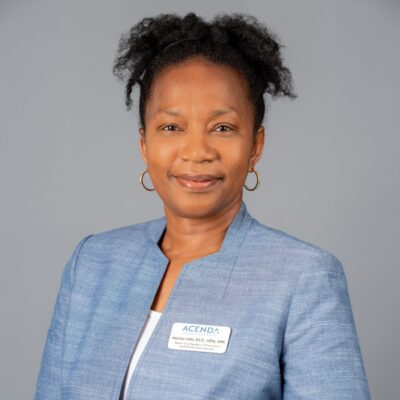 Dr. Monica Lallo is an educator, team strategist, and advocate for improving government and nonprofit services to underserved youth and families. Throughout her professional career, she has been committed to bridging the socioeconomic divide that exists in under-resourced communities. Dr. Lallo has extensive experience specializing in contract management, program development, and evaluation over her eleven years in county government. She produced several accomplishments with the creation of numerous initiatives that helped improve service delivery outcomes, increase stakeholder involvement, and promote networking among nonprofit organizations serving youth and families in Union County (New Jersey).
Dr. Monica Lallo is an educator, team strategist, and advocate for improving government and nonprofit services to underserved youth and families. Throughout her professional career, she has been committed to bridging the socioeconomic divide that exists in under-resourced communities. Dr. Lallo has extensive experience specializing in contract management, program development, and evaluation over her eleven years in county government. She produced several accomplishments with the creation of numerous initiatives that helped improve service delivery outcomes, increase stakeholder involvement, and promote networking among nonprofit organizations serving youth and families in Union County (New Jersey).
Dr. Lallo also served as a resource to local agency providers seeking state and national research information about services, which was rated effective by the Office of Juvenile Justice and Delinquency Prevention (part of the U.S. Justice Department), and national foundations that support youth initiatives. Dr. Lallo received her Doctorate in Education from Immaculata University, her master’s degree in Public Administration from New York University, and her bachelor’s degree in Psychology and Criminal Justice from Rutgers University. She taught several courses at Rowan College at Burlington County (RCBC) in their Human Services Program as a Senior Adjunct Professor.
